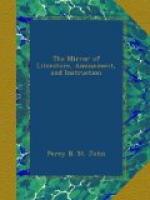P.T.W.
* * * * *
THE HAWTHORN WELL.
[The following lines are associated with a singular species of popular superstition which may in some measure, explain the “pale cast of thought” that pervades them. They are written by a native of Northumberland. “The Hawthorn Well,” was a Rag Well, and so called from persons formerly leaving rags there for the cure of certain diseases. Bishop Hall, in his Triumphs of Rome, ridicules a superstitious prayer of the Popish Church for the “blessing of clouts in the way of cure of diseases;” and Mr. Brand asks, “Can it have originated thence?” He further observes:—“this absurd custom is not extinct even at this day: I have formerly frequently observed shreds or bits of rag upon the bushes that overhang a well in the road to Benton, a village in the vicinity of Newcastle-upon-Tyne, which, from that circumstance, is now or was very lately called The Rag Well. This name is undoubtedly of long standing: probably it has been visited for some disease or other, and these rag-offerings are the relics of the then prevailing popular superstition.”—Brand’s Popular Antiquities, vol. ii. p. 270.]
“From hill, from dale,
each charm is fled;
Groves, flocks, and fountains,
please no more.”
No joy, nor hope, no pleasure, nor its
dream,
Now cheers my heart. The current
of my life
Seems settled to a dull, unruffled lake,
Deep sunk ’midst gloomy rocks and
barren hills;
Which tempests only stir and clouds obscure;
Unbrightened by the cheerful beam of day,
Unbreathed on by the gentle western breeze,
Which sweeps o’er pleasant meads
and through the woods,
Stirring the leaves which seem to dance
with joy.
No more the beauteous landscape in its
pride
Of summer loveliness—when every
tree
Is crowned with foliage, and each blooming
flower
Speaks by its breath its presence though
unseen—
For me has charms; although in early days,
Ere care and grief had dulled the sense
of joy,
No eye more raptured gazed upon the scene
Of woody dell, green slope, or heath-clad
hill;
Nor ear with more delight drank in the
strains
Warbled by cheerful birds from every grove,
Or thrilled by larks up-springing to the
sky.
From the hill side—where
oft in tender youth
I strayed, when hope, the sunshine of
the mind,
Lent to each lovely scene, a double charm
And tinged all objects with its golden
hues—
There gushed a spring, whose waters found
their way
Into a basin of rude stone below.
A thorn, the largest of its kind, still
green
And flourishing, though old, the well
o’erhung;
Receiving friendly nurture at its roots
From what its branches shaded; and around
The love-lorn primrose and wild violet
grew,
With the faint bubbling of that limpid
fount.




